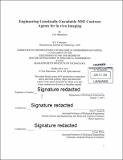Engineering genetically-encodable MRI contrast agents for in vivo imaging
Author(s)
Matsumoto, Yuri, Ph. D. Massachusetts Institute of Technology
DownloadFull printable version (9.404Mb)
Alternative title
Engineering genetically-encodable magnetic resonance imaging contrast agents for in vivo imaging
Other Contributors
Massachusetts Institute of Technology. Department of Biological Engineering.
Advisor
Alan P. Jasanoff.
Terms of use
Metadata
Show full item recordAbstract
Magnetic resonance imaging (MRI) is gaining recognition as a powerful tool in biological research, offering non-invasive access to anatomy and activity at high spatial and temporal resolution. However, the range of biological phenomena accessible to measurement by MRI is limited, due to a current lack of molecular-level methods for detecting physiological processes in living organisms. One way to overcome this limitation is to develop contrast agents that report physiological events at a molecular level. Traditionally MRI contrast agents have been based on small molecules that chelate paramagnetic ions such as Gd (III), but synthesis and delivery of such exogenously applied agents are complicated. Genetically-encodable MRI sensors may overcome some of these issues. In this thesis, we describe new class of MRI contrast agents which will be broadly applicable as genetically-controlled tools for in vivo imaging. The major goal of my thesis research was to improve the sensitivity of the existing protein-based MRI contrast agent, ferritin (Ft) by inducing it to accumulate larger number of iron atoms per particle in a physiological environment. Using a high throughput genetic screening process, we obtained Ft mutants that show threefold greater cellular iron accumulation than mammalian heavy chain Ft. In another project, we used the engineered Ft to develop a dynamic gene reporter that responds to changes in gene expression levels in vivo via aggregation-dependent MRI contrast changes. Successful creation of genetically-encodable MRI contrast agents that are robust and sensitive enough to be applied in vivo will enable neuroscientists and biologists to study molecular processes of living subjects.
Description
Thesis: Ph. D., Massachusetts Institute of Technology, Department of Biological Engineering, 2014. Cataloged from PDF version of thesis. Includes bibliographical references (pages 129-150).
Date issued
2014Department
Massachusetts Institute of Technology. Department of Biological EngineeringPublisher
Massachusetts Institute of Technology
Keywords
Biological Engineering.